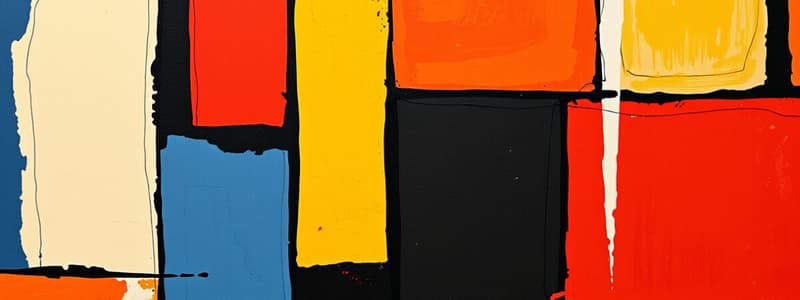Podcast
Questions and Answers
What role do interpretations play in understanding literature?
What role do interpretations play in understanding literature?
- Interpretations are broad and facilitate understanding of a work. (correct)
- Interpretations are preferred methods of summarizing literary works.
- Interpretations require minimal engagement with the text.
- Interpretations are singular and not subject to debate.
How can literary discussions enhance student learning?
How can literary discussions enhance student learning?
- By enabling critical thinking and reflective responses (correct)
- By encouraging memorization of plots
- By focusing solely on historical contexts of the works
- By limiting conversations to only the author's intent
What is the primary goal of literary criticism?
What is the primary goal of literary criticism?
- To promote specific literary works
- To entertain readers with stories
- To censor inappropriate literature
- To study, evaluate, and interpret literature (correct)
Which statement best characterizes literary interpretation?
Which statement best characterizes literary interpretation?
What does archetypal criticism focus on?
What does archetypal criticism focus on?
Which statement best describes the relationship between literary criticism and literary theory?
Which statement best describes the relationship between literary criticism and literary theory?
How does feminist criticism approach literature?
How does feminist criticism approach literature?
Which of the following best describes reader-response criticism?
Which of the following best describes reader-response criticism?
What aspect does Marxist criticism primarily emphasize?
What aspect does Marxist criticism primarily emphasize?
Which of the following is NOT a literary theory mentioned in the content?
Which of the following is NOT a literary theory mentioned in the content?
What does deconstruction posit about the meaning of literature?
What does deconstruction posit about the meaning of literature?
What is a key component of literary criticism?
What is a key component of literary criticism?
Which aspect does formalism primarily focus on in a literary work?
Which aspect does formalism primarily focus on in a literary work?
Psychoanalytic criticism draws heavily from whose theories?
Psychoanalytic criticism draws heavily from whose theories?
What does postcolonial criticism analyze in literary texts?
What does postcolonial criticism analyze in literary texts?
In queer theory, what is the primary challenge to traditional perspectives?
In queer theory, what is the primary challenge to traditional perspectives?
What is a key concept of New Historicism regarding literature?
What is a key concept of New Historicism regarding literature?
The primary importance of literary theories lies in which of the following?
The primary importance of literary theories lies in which of the following?
What is a misconception about literary theories?
What is a misconception about literary theories?
What is one of the primary responsibilities of a literary critic?
What is one of the primary responsibilities of a literary critic?
Which of the following periods is NOT mentioned as notable in the context of literary criticism?
Which of the following periods is NOT mentioned as notable in the context of literary criticism?
How does literary criticism contribute to a reader's understanding?
How does literary criticism contribute to a reader's understanding?
What does the term 'canon' refer to in literary criticism?
What does the term 'canon' refer to in literary criticism?
Which question is NOT essential when reading literary criticism?
Which question is NOT essential when reading literary criticism?
What does the Greek origin of the word 'critic' imply?
What does the Greek origin of the word 'critic' imply?
Which statement best reflects the purpose of literary criticism?
Which statement best reflects the purpose of literary criticism?
What key aspect should one consider regarding the type of literary criticism being read?
What key aspect should one consider regarding the type of literary criticism being read?
Flashcards are hidden until you start studying
Study Notes
Literary Criticism Overview
- Literary criticism involves the study, evaluation, and interpretation of literature.
- Modern criticism is influenced by literary theory, guiding discussions on literature's goals and methods.
Definitions
- Literary: Pertains to writing, study, or content valued for literary quality.
- Criticism: Expresses disapproval based on perceived faults or analyzes merits and faults of literary works.
Literary Criticism vs. Literary Theory
- Literary theory classifies texts into categories and schools of thought.
- Functions as a critical lens for analyzing literature.
Types of Literary Theories
- Archetypal Criticism: Interprets texts based on recurring archetypes across literature.
- Feminist Criticism: Examines literature's treatment of women, highlighting patriarchal perspectives.
- Marxist Criticism: Focuses on class and power dynamics within literature.
- Reader-Response Criticism: Emphasizes reader interpretation in creating meaning from texts.
- Deconstruction: Believes literature has no fixed meaning, asserting the instability of language.
- Formalism: Analyzes literature based solely on its form, independent of context.
- Psychoanalytic Criticism: Uses Freudian concepts to explore authors' unconscious motivations through texts.
- Postcolonial Criticism: Addresses themes related to colonialism and cultural identities within literature.
- Queer Theory: Investigates gender and sexuality representations, challenging societal norms.
- New Historicism: Considers the influence of historical contexts on both literature and criticism.
Importance of Literary Theories
- Provides frameworks for analysis to enhance understanding of literature and its context.
- No single theory is superior; each offers different insights into literary works.
Function of Literary Criticism
- Encompasses a wide range of activities, including book reviews and theoretical discussions on literature and authors.
Purpose of Literary Criticism
- Helps clarify meanings of literary works and assess their influence on readers.
- Aims to evaluate literature's value and significance.
Role of Literary Critics
- Literary critics analyze and evaluate texts, using established theories for support.
- The term "critic" derives from Greek, meaning "to discern" or "to classify."
Reading Literary Criticism
- Critical reading involves identifying the type of writing: analytical vs. subjective.
- Consider the focus on facts vs. interpretations and necessary background information.
Literary Discussion vs. Analysis vs. Interpretation
- Literary Discussion: Encourages critical thinking and reflection on the text.
- Literary Analysis: Entails close examination of writing elements for deeper understanding.
- Literary Interpretation: Expands understanding of a text through in-depth analysis and acknowledges multiple meanings.
Key Aspects of Interpretation
- Interpretations derive from thorough textual analysis.
- Meaning in literature can vary and is subject to debate.
Studying That Suits You
Use AI to generate personalized quizzes and flashcards to suit your learning preferences.




